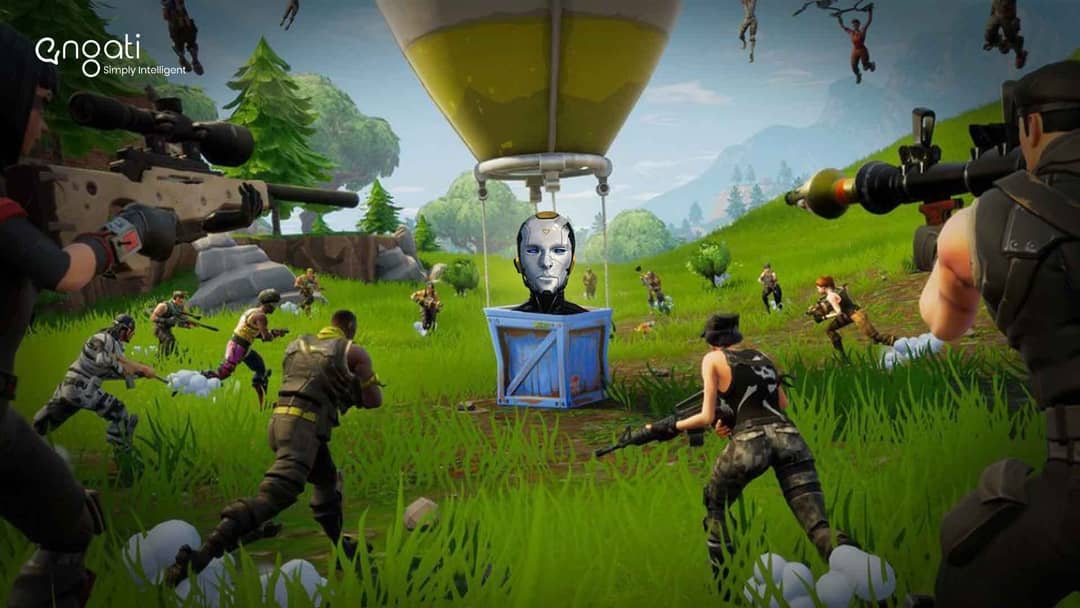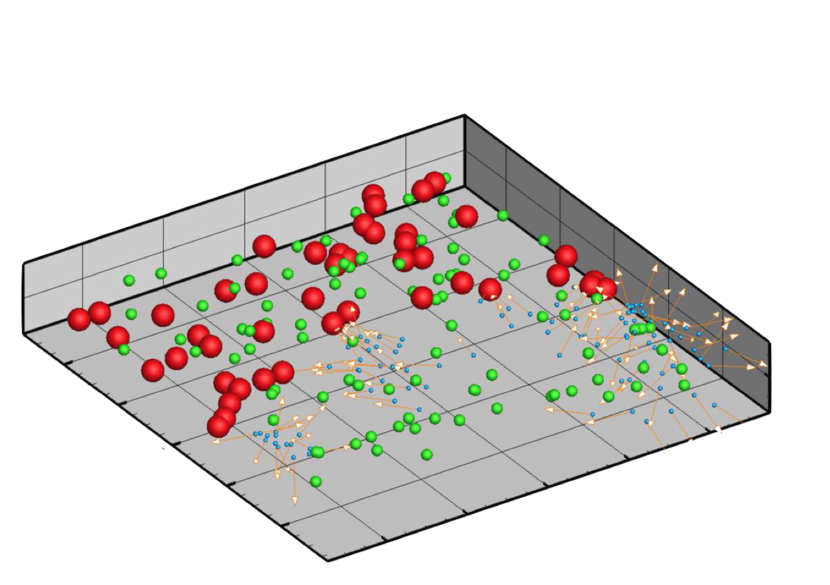Agent-oriented Programming in Gaming: Transforming Game AI
Video game characters that think for themselves, learn from their mistakes, and make strategic decisions in real-time are becoming a reality thanks to agent-oriented programming (AOP). This innovative approach to game AI development is transforming how virtual characters behave, react, and evolve within game worlds.
Imagine a non-player character (NPC) that doesn’t just follow pre-scripted routines but actively analyzes the game environment, forms dynamic strategies, and adapts its behavior based on player interactions. That’s the power of agent-oriented programming, where intelligent software agents serve as the fundamental building blocks for creating sophisticated game AI.
As reported by Inworld AI, while AI agents in video games currently demonstrate basic goal-oriented behaviors and decision-making capabilities, they are rapidly evolving toward more sophisticated systems capable of adapting to dynamic gameplay situations and implementing complex strategies in real-time.
Gone are the days of predictable, scripted AI behaviors. Today’s agent-based systems can perceive their environment, make autonomous decisions, and take independent actions toward achieving their goals—whether that’s outsmarting players in a strategy game, coordinating with teammates in a multiplayer match, or creating more engaging NPC interactions in an RPG.
This exploration into agent-oriented programming for games will examine how this paradigm is revolutionizing game AI development, the powerful frameworks and tools enabling these advances, and the incredible possibilities and key challenges developers face when implementing agent-based systems. Whether you’re a game developer, AI enthusiast, or simply curious about the future of gaming, understanding AOP’s transformative impact on game AI has never been more relevant.
Applications of Agent-oriented Programming in Game Development
Agent-oriented programming (AOP) has significantly enhanced modern game development by creating more intelligent and dynamic virtual worlds. This programming paradigm builds complex non-player characters (NPCs), generates dynamic content, and crafts responsive game environments that adapt to player interactions.
The most prominent application of AOP in games is the development of sophisticated NPCs with autonomous decision-making capabilities. Unlike traditional programming approaches that rely on simple scripted behaviors, agent-based NPCs can demonstrate diverse behaviors and adaptability, making them more believable and engaging for players. These intelligent agents can analyze their environment, make strategic decisions, and even learn from their interactions with players.
In procedural content generation, AOP enables developers to create vast, dynamic game worlds that evolve organically. Rather than manually designing each element, agent-oriented systems can autonomously generate landscapes, quests, and interactive elements that respond to player actions and preferences. This approach not only saves development time but also ensures each playthrough offers a unique experience.
The implementation of in-game economies represents another crucial application of AOP. Agent-based systems can simulate complex market dynamics, where virtual traders and merchants operate as autonomous agents, adjusting prices and inventory based on supply and demand. This creates more realistic economic systems that respond naturally to player activities and market conditions.
By leveraging AOP’s capabilities, game developers can craft immersive environments where every element, from character behaviors to world dynamics, feels authentic and responsive. This technological approach has transformed gaming from static, predetermined experiences into living, breathing virtual worlds that captivate players through their depth and adaptability.
Key Frameworks and Tools for Agent-oriented Programming
Agent-oriented programming (AOP) has significantly impacted game development by enabling the creation of sophisticated, autonomous AI agents. Leading frameworks and tools have emerged to streamline this complex process, making intelligent agent development more accessible.
Unity Machine Learning Agents Toolkit is a powerful framework that integrates with the Unity game engine. This toolkit empowers developers to train intelligent agents using reinforcement learning and imitation learning techniques, leveraging Unity’s graphical capabilities to create immersive training environments. The framework’s dual support for Python and C# APIs makes it accessible for developers from diverse programming backgrounds.
OpenAI Gym is a prominent framework for reinforcement learning in gaming applications. It provides a standardized interface that allows AI agents to interact with various gaming environments seamlessly. OpenAI Gym’s extensive collection of pre-defined environments enables developers to test and refine their agents across different scenarios before implementing them in custom games.
The Microsoft Bot Framework brings a different dimension to agent development, focusing on creating interactive and conversational agents. While less commonly associated with traditional gaming, it’s gaining traction for developing NPCs (Non-Player Characters) that can engage in natural dialogue with players, adding depth to story-driven games and virtual worlds.
The key to successful agent-oriented programming lies in choosing the right framework that aligns with specific development needs and performance requirements. Each framework offers unique advantages while presenting distinct challenges. Unity ML-Agents excels in visual learning scenarios but requires familiarity with the Unity ecosystem. OpenAI Gym provides excellent standardization but may need additional customization for specific game mechanics. The Microsoft Bot Framework offers superior conversational capabilities but might require extra work to integrate with game-specific features.
Understanding these nuances helps developers make informed decisions when selecting tools for their projects. The choice ultimately depends on factors like the desired agent behavior complexity, required performance levels, and the specific game genre being developed.
Overcoming Challenges in Agent-oriented Programming
Agent-oriented programming (AOP) has emerged as a powerful paradigm for building autonomous software systems. However, implementing it effectively comes with significant hurdles. As organizations scale their agent-based solutions, they encounter complex integration challenges that can impact system performance and reliability.
Resource allocation is one of the most pressing challenges when scaling AOP systems. When numerous agents compete for limited computational resources and processing power, traditional allocation methods often fall short. In autonomous vehicle networks, each vehicle-agent requires varying levels of resources based on changing traffic conditions and routing demands. Without sophisticated allocation mechanisms, these bottlenecks can severely degrade overall system performance.
Communication overhead poses another significant challenge as agent populations expand. In large-scale systems, the sheer volume of messages exchanged between agents can overwhelm network capacity. Consider a smart manufacturing facility with hundreds of robotic agents coordinating assembly tasks. Each additional agent exponentially increases the communication pathways that must be managed. Recent research shows that maintaining efficient information exchange becomes increasingly challenging with scale.
Maintaining agent autonomy while ensuring coordinated behavior presents a delicate balance. Agents need sufficient independence to make decisions and adapt to changing conditions, yet must also work cohesively toward system-wide objectives. This challenge is particularly evident in financial trading systems, where microsecond-level discrepancies in market data between agents can lead to conflicting decisions and potential losses.
To address these challenges, organizations are implementing robust frameworks that provide built-in monitoring and optimization capabilities. These frameworks help manage resource allocation, streamline communication protocols, and maintain appropriate levels of agent autonomy. Additionally, implementing hierarchical agent structures allows systems to better distribute workloads and minimize direct communication overhead by organizing agents into logical tiers.
| Challenge | Solution |
|---|---|
| High capital and operating costs | Development of more cost-efficient AOP technologies |
| Safety concerns with powerful oxidants | Implementing stringent safety protocols and training for operators |
| Need for skilled operators and maintenance personnel | Providing comprehensive training and support for personnel |
| High energy consumption | Adopting energy-efficient AOP methods like SO4•− |
| Complex reaction kinetics in wastewater | Conducting detailed studies to understand and optimize reaction mechanisms |
| Communication overhead in large-scale systems | Implementing hierarchical agent structures to streamline communication |
| Maintaining agent autonomy while ensuring coordinated behavior | Using frameworks with built-in monitoring and optimization capabilities |
To cope with these twin issues of scalability and variable numbers, multi-agent systems need to be both self-building and adaptive, able to determine the most appropriate organizational structure for the system by themselves at run-time.
Improving the Scalability of Multi-agent Systems – Springer
Success in scaling agent-oriented systems ultimately requires careful consideration of resource management strategies, optimized communication protocols, and robust consistency mechanisms. By implementing these solutions while maintaining continuous monitoring, organizations can build resilient agent-based systems that gracefully handle increased complexity while delivering reliable operations.
Benefits of Using SmythOS for Game AI Development
Game developers face mounting challenges when integrating artificial intelligence into their projects. SmythOS addresses these pain points with a comprehensive suite of tools designed specifically for game AI development. The platform’s built-in monitoring capabilities provide real-time insights into AI agent performance, allowing developers to identify and resolve issues before they impact gameplay.
The platform’s visual builder transforms complex AI workflows into intuitive, manageable components. Developers can design sophisticated game AI systems through a drag-and-drop interface, accelerating development while reducing technical barriers.
Integration capabilities set SmythOS apart in the gaming space. The platform seamlessly connects with various APIs and data sources, enabling game AI to interact naturally with different game systems. Whether coordinating NPC behaviors or managing dynamic in-game economies, SmythOS handles the technical complexity behind the scenes.
Enterprise-grade security controls ensure game data and AI systems remain protected. This is crucial for multiplayer games and online environments where data integrity directly impacts player experience. According to VentureBeat, SmythOS empowers developers across all divisions to harness AI capabilities without requiring specialized expertise.
Perhaps most importantly, SmythOS excels at automatic scaling. As player counts fluctuate and processing demands change, the platform dynamically adjusts resources to maintain optimal performance. This ensures smooth gameplay experiences whether supporting a handful of players or thousands of concurrent users.
By ensuring students truly understand the future of AI Orchestration and are equipped to walk into companies across the globe with a fundamental understanding of how to build multi-agent systems, we believe we can empower future generations to harness the power of artificial intelligence rather than fear it.
Michael Walker, SmythOS CMO
Game AI development doesn’t have to be a bottleneck in production anymore. With SmythOS’s combination of monitoring tools, visual development environment, robust integration capabilities, enterprise security, and automatic scaling, developers can focus on creating engaging player experiences while the platform handles the technical complexities of AI implementation.
Future Directions in Agent-oriented Programming


Characters in gear fight near a hovering supply drop. – Via webflow.com
AI agents are transforming gaming, reshaping how virtual worlds interact with players. These advancements are creating experiences that feel more organic and personalized.
Enhanced contextual awareness in AI agents is at the forefront of this evolution. According to Inworld AI, future agents will understand nuanced social and environmental cues, enabling them to respond appropriately to complex situations within game worlds. Imagine an AI character that not only recognizes when you enter a room but also understands the broader implications of your presence based on past interactions and current circumstances.
Memory systems in gaming AI are undergoing a remarkable transformation. Future AI agents will possess sophisticated memory capabilities, enabling them to form lasting relationships with players, remembering past interactions and adjusting their behavior accordingly. This advancement means that every choice you make could have lasting implications on how characters perceive and interact with you throughout your gaming journey.
| Aspect | Current AI Capabilities | Future Projections |
|---|---|---|
| NPC Behavior | Scripted routines and basic goal-oriented behaviors | Dynamic strategies and adaptive behaviors based on player interactions |
| Decision Making | Basic choices based on predetermined parameters | Autonomous decision-making adapting to real-time changes |
| Procedural Content Generation | Static content with limited adaptability | Organic evolution of landscapes, quests, and interactive elements |
| Emotional Engagement | Limited to pre-defined responses | Natural, context-aware conversations and emotional depth |
| Memory Systems | Minimal retention of player interactions | Long-term memory forming lasting relationships with players |
| In-game Economies | Simple economic models | Complex market dynamics responding to player activities |
Decision-making capabilities are evolving to become more sophisticated and dynamic. While current AI agents can make basic choices based on predetermined parameters, future iterations will demonstrate autonomous decision-making that adapts to player behavior and environmental changes in real-time. This evolution will lead to more challenging and engaging gameplay experiences where AI opponents can develop and implement complex strategies.
Advancements in natural language processing are particularly exciting for gaming applications. AI agents will soon engage in more natural, context-aware conversations with players, moving beyond simple scripted responses to genuine dialogue that reflects the character’s personality and circumstances. This development promises to create more immersive storytelling experiences where every interaction feels unique and meaningful.
When you can imbue virtual characters with advanced cognitive capabilities, it unlocks a completely new paradigm for storytelling and gameplay
Kylan Gibbs, CEO of Inworld AI
These technological strides are converging to create entirely new possibilities for interactive entertainment. From procedurally generated content that adapts to player preferences to AI-driven narrative systems that create unique storylines on the fly, the future of agent-oriented programming in gaming promises experiences that are more responsive, immersive, and personally meaningful than ever before.
Conclusion: Embracing Agent-oriented Programming in Game AI


Clusters illustrating data relationships in AI development. – Via smythos.com
Agent-oriented programming represents a transformative leap for game AI development. By treating AI entities as autonomous agents capable of independent decision-making and environmental interaction, developers can create richer, more dynamic gaming experiences that adapt to player behavior in real-time. These intelligent agents elevate games beyond scripted responses to deliver truly emergent gameplay.
Implementing AOP in gaming unlocks remarkable possibilities for creating more engaging virtual worlds. AI agents can now collaborate in sophisticated multi-agent systems, coordinate strategic decisions, and even generate procedural content that keeps games fresh and unpredictable. This paradigm shift enables NPCs to exhibit more natural behaviors, making game worlds feel alive and responsive to player actions.
Modern platforms like SmythOS streamline the development process with built-in monitoring capabilities, seamless integration options, and automatic scaling features. These tools democratize AI development, allowing even smaller studios to implement complex agent-based systems that rival those of major developers. The platform’s visual workflow builders and debugging environments make it easier than ever to create and deploy sophisticated AI agents.
Looking ahead, agent-oriented programming will continue to push the boundaries of what’s possible in game AI. From NPCs with long-term memory and evolving relationships to dynamic ecosystems where every entity operates with unprecedented independence, AOP opens new frontiers for creating immersive gaming experiences. While challenges remain in scaling these systems and balancing agent autonomy with narrative coherence, the future of game AI has never been more promising.
Embracing this technology means fundamentally reimagining how virtual worlds can behave and interact with players. The combination of agent-oriented programming principles with modern development platforms empowers creators to build the next generation of intelligent, responsive, and truly engaging gaming experiences.
Last updated:
Disclaimer: The information presented in this article is for general informational purposes only and is provided as is. While we strive to keep the content up-to-date and accurate, we make no representations or warranties of any kind, express or implied, about the completeness, accuracy, reliability, suitability, or availability of the information contained in this article.
Any reliance you place on such information is strictly at your own risk. We reserve the right to make additions, deletions, or modifications to the contents of this article at any time without prior notice.
In no event will we be liable for any loss or damage including without limitation, indirect or consequential loss or damage, or any loss or damage whatsoever arising from loss of data, profits, or any other loss not specified herein arising out of, or in connection with, the use of this article.
Despite our best efforts, this article may contain oversights, errors, or omissions. If you notice any inaccuracies or have concerns about the content, please report them through our content feedback form. Your input helps us maintain the quality and reliability of our information.
